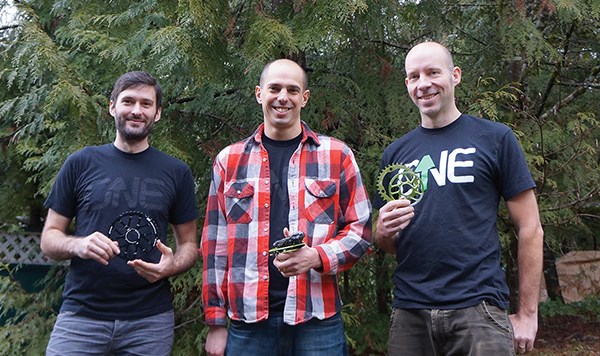Squamish-based OneUp Components is a seedling in the Squamish forest of rec-tech companies.
The startup epitomizes the roots of many successful Squamish “rec-techs,” which produce technologically advanced products that aid recreation. At the heart of the company are outdoor enthusiasts who had a dream to spend more time outside and less time working.
OneUp’s founders Jonathan Staples, Chris Heynen and Sam Richards are engineers who launched their first product, a mountain bike sprocket and cassette that extends a bike’s gear-ratio range, about 18 months ago. The product was a project that allowed them to live in Squamish and create for their shared passion, mountain biking.
“Being able to move to Squamish was a big catalyst to us being able to step out on our own,” said Staples.
The men had a combined 25 years in the biking industry and wanted to continue in it, creating a business in the place where they rode.
Products are manufactured overseas. Warehousing, shipping and some assembly are completed in Squamish.
Their venture has been more successful than they expected – they now ship to 72 countries and counting – so their next goal is to move out of their living rooms and into an affordable shared space in Squamish that will allow their company to grow. The location will be close to the trails.
Another local company, 7Mesh, is nestled in a funky open concept workspace on “rec-tech” corner, near Queens Way and Commercial Way. The outdoor cycling-apparel company has made a name for itself in Squamish and around the world. 7Mesh items are sold in eight countries. A full new apparel line will hit shops in March.
Products are designed and prototypes are made in Squamish, and manufacturing is done in Asia. The company employs seven people locally.
The brains behind the company stay true to their roots by carving out time to get out and hit the trails found just outside their door.
“For us it is about getting out and testing new product,” said 7Mesh’s Brian Goldstone.
Jeff Cooke, president of the mountain biking lobby group Squamish Off-Road Cycling Association (SORCA), said rec-tech companies give validity to the sport of mountain biking.
“These guys love biking and they recognize how important our biking infrastructure is,” Cooke said. “In the long run it makes Squamish not only a tourist destination for mountain biking, but it is creating kind of an epicentre for mountain biking and other rec-tech industries.”
Like a forest, the rec tech industry is an ecosystem – each layer dependent on, or feeding, the next layer, the entrepreneurs explain. There are the elite athletes who train in Squamish, and then trail builders (Dream Wizards) who advance the trail system, which in turn further attracts athletes. There are the designers and gear manufacturers, such as 7Mesh and OneUp, that use Squamish as a base for research and development, because of the access to the athletes and the trails.
Then there’s a layer of photographers and filmmakers who capture the athletes in action (Anthill Films), and industry media that reflect athletes’ images and knowledge (PinkBike and Mountain Life magazine).
Bad Monkey, a company now five years old, offers both product design and brand building for the outdoor industry.
“In today’s world you can build in China and establish your headquarters anywhere and ship anywhere,” said Bad Monkey’s owner, Damien Kelly.
Kelly has been involved with various Squamish rec-tech companies since 1993 and said contrary to popular belief, rec-tech isn’t new to the district.
“With social marketing and all of that, it just has become widely known,” he said.
Kelly said what is new is that more companies are using the fact they are from Squamish as a selling point instead of hiding it. When he first got started more than 20 years ago, some businesses would say they were from Vancouver, even if they were based in Squamish, he said. “Now it suddenly got a cachet,” he said.
Kelly said he would like to see lower rents and taxes in the district to help the industry along. This is a sentiment echoed by other rec-tech owners.
“Squamish is in a unique position…. If they want to create a sustainable economy, they should be looking at how do we give a break to corporations coming to set up outdoor businesses,” he said.
Mayor Patricia Heintzman said council has worked over the past few years to align Squamish to be competitive with commercial tax rates in other B.C. communities.
“Council has an opportunity to help encourage the right developers to build the facilities that rec-tech clients might need, connecting the dots between the two groups,” Heintzman told The Squamish Chief by email.
“Council continues to place importance on the lifestyle aspect of Squamish that will draw in a critical mass of human capital, helping to support and enhance this growing sector.”



